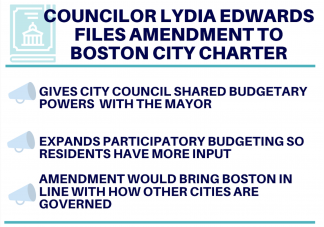Councilor Lydia Edwards (District 1) proposed that the City Council share equal budgeting power with the mayor during the weekly City Council meeting on Wednesday afternoon. The proposed amendment comes after public dissatisfaction with the FY21 budget approvals where protesters demanded funds be reallocated from the Boston Police Department into community services.
Councilor Edwards’ amendment to the city charter was approved by the City Council and will now have to be passed by the attorney general. In the case that the amendment is accepted, voters would have the option to vote for it on the 2021 election ballot.

The amendment would give the City Council the power to originate proposals for the City’s capital and operating budgets, modify items in proposals, designate a portion of the budget for a participatory budgeting process, and amend the budget for Boston Public Schools.
“We need to break this wheel,” stated Councilor Edwards, citing frustration over the City Council’s lack of power when it comes to the City’s budget.
Last month, the City Council approved the upcoming fiscal year’s budget despite racial injustice protesters maintaining the proposed budget did not meet expectations for drastic police reform. The approved FY21 budget included a reallocation of 20% of the City’s police overtime budget toward community programs.
Read the entire filing below.
Councilors Kenzie Bok (District 8) and Julia Mejia (At-Large) suggested a different approach to the City’s budgeting process known as zero-based budget.
With a zero-based budgeting process, every year an organization must request an allocation of funds that best aligns with their central goals instead of alterations of the year’s previous budget. Advocates believe this approach would reimagine the community and tackle systemic racism.
Councilors Bok and Mejia also filed a separate proposal regarding participatory budgeting, which would require a multi-step process to increase civic engagement in the budgeting process. This could be accomplished by evaluating residents’ access to the meeting’s location, language barriers, and overrepresentation of certain groups.






Interesting. Consider a zero-based property tax policy. They wrangle their budget and then ask taxpayers to support it. It’s not like they will not spend every nickle they squeeze from taxpayers. For instance, they can whimsically rule that landlords aren’t entitled to their rents, but I didn’t hear where they forgave or cut property taxes. I saw where a man was barred from using a public street while protesters occupied it. More than likely he was the taxpayer. What is needed is an organized taxpayer strike. Not another penny until the public is included in the budget decisions.